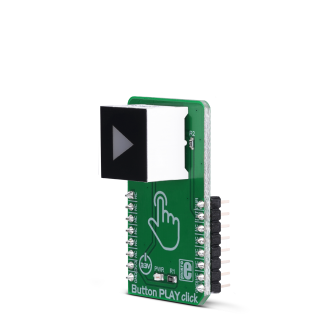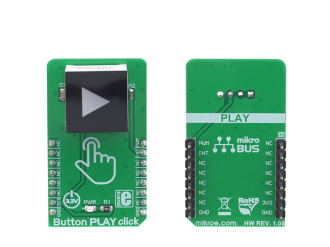
We strongly encourage users to use Package manager for sharing their code on Libstock website, because it boosts your efficiency and leaves the end user with no room for error. [more info]

Rating:
Author: MIKROE
Last Updated: 2019-01-21
Package Version: 1.0.0.0
mikroSDK Library: 1.0.0.0
Category: Capacitive
Downloaded: 5475 times
Not followed.
License: MIT license
Button PLAY click is a very interesting interactive gadget on a Click board. It is an integrated capacitive touch sensor display in the form of a button.
Do you want to subscribe in order to receive notifications regarding "Button PLAY click" changes.
Do you want to unsubscribe in order to stop receiving notifications regarding "Button PLAY click" changes.
Do you want to report abuse regarding "Button PLAY click".


Library Description
Library contains function for checking state of INT pin.
Key functions:
uint8_t buttonplay_intGet( void ) - returns state of INT pin.Examples description
The application is composed of the three sections :
void applicationTask( )
{
for (i = 0; i < dutyRatio; i += 1)
{
buttonplay_pwmSetDuty( i );
Delay_ms(3);
}
for (i = dutyRatio; i > 0; i -= 1)
{
buttonplay_pwmSetDuty( i );
Delay_ms(3);
}
}
Other mikroE Libraries used in the example:
PWMUARTAdditional notes and informations
Depending on the development board you are using, you may need USB UART click, USB UART 2 clickor RS232 click to connect to your PC, for development systems with no UART to USB interface available on the board. The terminal available in all MikroElektronika compilers, or any other terminal application of your choice, can be used to read the message.